As these four days are drawing to a close, I find that I have seen the far-left side of this city’s politics that has not been covered in the mainstream news coverage of the Democratic Convention. I also got a glimpse of what may be a problem for Barack Obama’s Colorado chances in the fall.
On Tuesday, I attended a forum hosted by the Progressive Democrats of America, a self-described Political Action Committee working within the Democratic Party. However, it was clear from the onset of the day’s events that the group rested well to the left of—and arguably outside of—the Democratic party’s platform. The guest speakers were Tom Hayden, a well-known anti-war protester and former California State Assemblyman, and Jim McDermott, a Democratic congressman from Washington.
Both Hayden and McDermott endorsed Barack Obama, but in both of their talks there was a call to greater action regarding some of the more extreme viewpoints in the Democratic party today, including a faster and more certain withdrawal of American forces from Iraq and an immediate impeachment of George W. Bush and Dick Cheney. To acclamation, Hayden lauded a book about the impeachment of Bush, and at one point he recommended that the audience “Learn more about 9/11 truth,” referencing a collection of “alternative explanations” for the September 11th Attacks.
 At one point, a man in the audience jumped to his feet and demanded that Hayden or McDermott speak to the fact that “McCain is a war criminal and he should be tried as such,” and protested something else incoherently; he was cheered by many in the audience but neither speaker directly responded to his questions (although Hayden knew him by name).
At one point, a man in the audience jumped to his feet and demanded that Hayden or McDermott speak to the fact that “McCain is a war criminal and he should be tried as such,” and protested something else incoherently; he was cheered by many in the audience but neither speaker directly responded to his questions (although Hayden knew him by name).
On Wednesday, I had the opportunity to see Rage Against the Machine in concert—they performed for free at the Denver coliseum alongside The Coup and the Flobots, a local Denver band. I didn’t know at the time that the concert was organized by the Iraq Veterans Against the War (IVAW). However, in between bands, as people protested the war, veterans spoke on stage in full dress uniform, and Jello Biafra revved up the crowd with angry epithets toward the Bush administration and corporate America, it became apparent that the concert was a stage setter for what was to become the main protest against the Democratic convention this week.
Biafra, known by most as just “Jello,” was the lead singer of the Dead Kennedys and was right at home in this crowd. He wore a t-shirt reading “F___ the Iraq War,” and walked with a crutch. Now at 50, he is hardly different from the anti-right icon he established himself as in the 80’s. Herein lies the biggest problem for Barack Obama this November. The crowd of more than ten thousand screaming fans that came to hear Rage Against the Machine could not get enough of Jello’s far-left, and ultimately anti-Obama rhetoric. To Jello, Obama is no different from McCain, and the two main political parties are two sides of the wrong coin. The message Jello presented was clear: “It’s better to vote for who you know will lose than to vote for who you know can win, but is wrong.” By advocating third party support among this crowd, Jello did more than isolate his message from that of the mainstream Democratic party—he potentially lost the Democrats thousands of votes in November. And in a battleground state like Colorado, far-left activists like Hayden and Jello can be the difference between a Democratic victory and defeat.
IVAW’s actual veterans presented a humble and moving image. In full uniform, they stood at attention as taps was played. For the full duration of the song, ten thousand screaming Rage-heads were silent. The Veterans presented the audience with the open letter that they expected to deliver to the Democratic Convention that day. It requested that Obama call for immediate withdrawal from Iraq, full veterans benefits, and full reparations to be paid to the Iraqi people.
When Rage Against the Machine finally took the stage, the crowd went wild. Then, four songs and many broken eardrums later, the band stopped and prepared for The March. As the Denver Post reported, as many as three thousand people, led by Rage Against the Machine and Iraq veterans in uniform, marched from the Denver Coliseum to the Pepsi Center–a distance of 3 miles in blistering 80-degree heat–to protest the war and deliver IVAW’s letter to the Democratic National Convention.
As it turns out, the protesters, who had been advocating non-violence as a mantra throughout the concert, were overwhelmingly peaceful, and little incidents occurred during the march. Hundreds of Denver police officers were present.
I did not go on the march, but to witness the events leading up to the march, including a rock concert that began at 11 in the morning, was a unique experience in itself. I had no idea I was going to be at the kickoff event for the biggest protest against the Democrats–ironically, the party I’m going to support in November! I never understood why anti-war activists would protest the Democratic convention instead of saving their resources for the Republican convention. I can only hope that the RNC is more heavily protested next week.
And finally, on Thursday, the last day of the convention, I made it over to Union Station, and found myself in a mob of MSNBC fans. MSNBC had set up a two-platform scaffold off of Wyncoop, and throughout the day as Chris Matthews was broadcasting live, hundreds of people gathered next to the platform, on national TV. Some took the opportunity to make silly faces and wave Barack Obama signs, but some tried to take advantage in more serious ways. During Hardball, a group of 9/11 Truthers gathered and began protesting. Matthews said on air: “There are a bunch of nutjobs behind me who believe that September 11th was a conspiracy…real nutjobs.”
Well, I had a chance to see these nutjobs up front. About five people wore shirts that read “9/11 was an inside job” and an overweight, angry little man with a megaphone chanted “NINE E-LEVEN WAS AN INSIDE JOB,” over and over again, like a broken record. The crowd thoroughly enjoyed this display, not because they agreed but because the “movement” was so easy to make fun of. Even the man who held the “Drop Acid, not Bombs” sign got in on the fun. A bunch of women started dancing to the rhythmic beatbox of conspiracy theory. At one point, the crowd started their own chant: “Get a life! Get a life!” I never got to see Obama speak in person, but the MSNBC protesters made it all worth it. It was a true Denver experience.
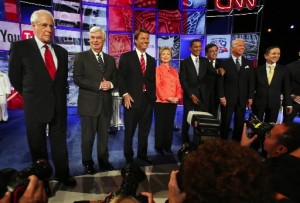 What is ironic, of course, is the last president we had who was not “elite” when he entered office and just as “common” when he left it was Truman–that’s 60 years of presidential candidates, all of whom try to portray themselves as fundamentally “common” to appeal to everyday voters. It is easy to see why candidates do it. Most voters are middle class, and to appeal to these voters it is important to come across as being one of the bunch. But what is upsetting is how many people buy into the dialog that wealth is a stigma in public life.
What is ironic, of course, is the last president we had who was not “elite” when he entered office and just as “common” when he left it was Truman–that’s 60 years of presidential candidates, all of whom try to portray themselves as fundamentally “common” to appeal to everyday voters. It is easy to see why candidates do it. Most voters are middle class, and to appeal to these voters it is important to come across as being one of the bunch. But what is upsetting is how many people buy into the dialog that wealth is a stigma in public life.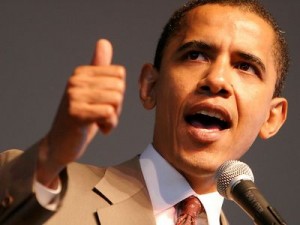 Politico just published an article about the election being
Politico just published an article about the election being 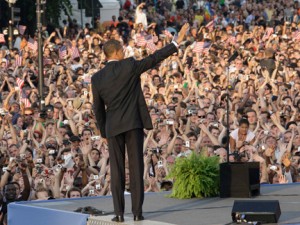 But now I find out that the campaign has sent its candidate into the Middle East and Europe for a high-profile tour, and I’m wondering, who’s paying for this? Who’s paying for the mileage Obama is putting on his private jet? Who’s paying for the gas for the motorcade of 20 vehicles Obama apparently used in Jordan? Who’s paying for catering costs and hotel bills for the 40 embedded journalists, and dozens of advisers and aides? Who’s paying for flyers advertising his arrival, and his upcoming speech in Berlin? Who’s paying for security, production costs, public speaking fees, city permits and cleaning up Berlin’s tiergarten?
But now I find out that the campaign has sent its candidate into the Middle East and Europe for a high-profile tour, and I’m wondering, who’s paying for this? Who’s paying for the mileage Obama is putting on his private jet? Who’s paying for the gas for the motorcade of 20 vehicles Obama apparently used in Jordan? Who’s paying for catering costs and hotel bills for the 40 embedded journalists, and dozens of advisers and aides? Who’s paying for flyers advertising his arrival, and his upcoming speech in Berlin? Who’s paying for security, production costs, public speaking fees, city permits and cleaning up Berlin’s tiergarten?
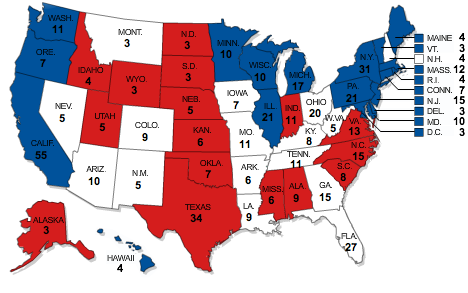
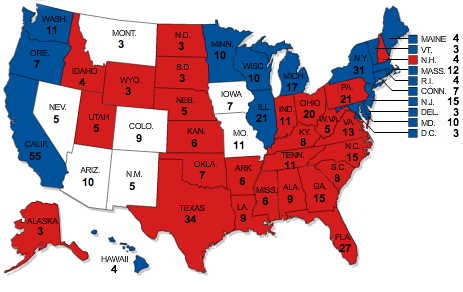
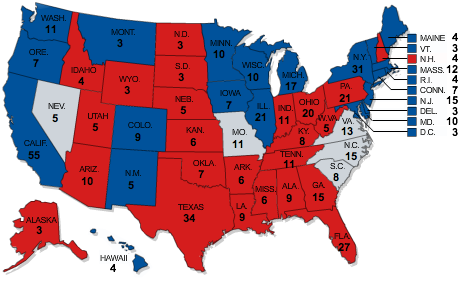
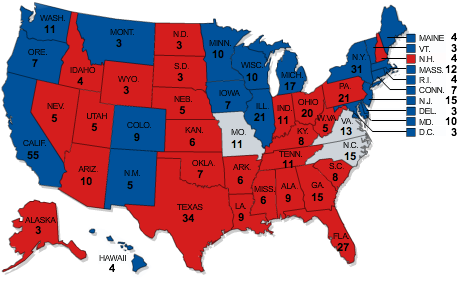
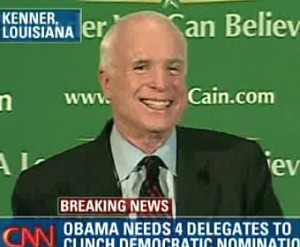 Plus, he says “The political environment, probably one of the worst in our party’s history…” I know this is what has been echoed on the blogs and on the news for months, but its not something a campaign manager says. You don’t maintain a positive outlook on things by saying that your chance of winning is horrible.
Plus, he says “The political environment, probably one of the worst in our party’s history…” I know this is what has been echoed on the blogs and on the news for months, but its not something a campaign manager says. You don’t maintain a positive outlook on things by saying that your chance of winning is horrible.